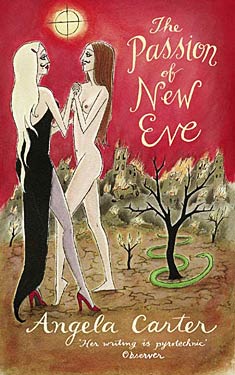Angela Carter
Completed 5/27/2020,
Reviewed 5/27/2020
3 stars
I have a
love-hate reaction to this book. On the
love side, it’s very poetic and explores race, gender, and gender roles in outrageous,
satirical ways. On the hate side, it has
a very negative portrayal of transgendered persons. Specifically, it has the notion that
transitioning is an act of violence and having a different gender identity is there
to shock. This book was first published
in 1977, so it reflects a lot of the mentality of that time period with regards
to all the issues it deals with. It’s
considered a post-feminist classic. But I
think reading this as a trans man or woman is analogous to me reading “The
Wanting Seed” by Anthony Burgess. It may
be a classic, but it does not represent me or my community in a healthy,
affirming light. Even as satire, this
book is just too negative in its representation of trans persons.
 The plot is
pretty crazy. In a very near-future
world (with 1977 being its reference point), Evelyn is an Englishman who gets a
job teaching at a university in New York.
When he gets to New York, he finds it is on the verge of chaos because
of race and gender wars. In fact, he
loses his job because the university is besieged by militant activists and
later blown up. Without a job, he meets
an African American woman Leilah. They end
up having a sexual relationship, but it’s devoid of emotion and borders on
sadistic. When she ends up pregnant, he
forces her to have an abortion. Then finding
out he has inherited some money, he takes it, buys a bulletproof car, and
drives to the desert. There, he is
captured by a militant women’s group where he is forcibly transgendered,
complete with functioning female reproductive organs. Now known as Eve, she escapes only to have a
series of more violent encounters culminating in a front row seat of an
apocalyptic end of the U.S.
The plot is
pretty crazy. In a very near-future
world (with 1977 being its reference point), Evelyn is an Englishman who gets a
job teaching at a university in New York.
When he gets to New York, he finds it is on the verge of chaos because
of race and gender wars. In fact, he
loses his job because the university is besieged by militant activists and
later blown up. Without a job, he meets
an African American woman Leilah. They end
up having a sexual relationship, but it’s devoid of emotion and borders on
sadistic. When she ends up pregnant, he
forces her to have an abortion. Then finding
out he has inherited some money, he takes it, buys a bulletproof car, and
drives to the desert. There, he is
captured by a militant women’s group where he is forcibly transgendered,
complete with functioning female reproductive organs. Now known as Eve, she escapes only to have a
series of more violent encounters culminating in a front row seat of an
apocalyptic end of the U.S.
Evelyn in
not a likeable guy. He doesn’t treat
women well. When he is forcibly made a
woman, Eve has to confront all the issues that come with being a woman,
including abuse, rape, religious oppression, and pregnancy. It takes Eve the whole book to understand
what it means to be a woman, and what it means to love. It’s sort of like a cross between Kafka,
Vonnegut, and William Burroughs with a feminist theme and an unsympathetic main
character. I use those names because they
represent the absurd, satire, and psychedelic writing in my reading history. There’s even what one might call pre-magical
realism. This book is a mashup of these. But unlike Kafka’s Joseph K or a Vonnegut
character, I had no empathy for the main character, either as Evelyn or as
Eve.
Evelyn has
an obsession with an old American actress, Tristessa de St. Ange, sort of an amalgam
of several tragic Hollywood divas. Tristessa
keeps on reappearing throughout the book, including literally. My take is that she is supposed to represent
the perfect woman, someone as Evelyn, he cannot meet, nor as Eve, aspire to
be. I think there is a lot of symbolism
in this book. I didn’t necessarily get most
of it, but it feels pretty heavy handed nonetheless. It makes me wonder if this is how the British
saw the U.S. in 1977, a violent, oppressive country with little hope for women. Carter is British and did spend time in the U.S.,
as well as in quite a few other countries around the world.
The author
uses very poetic language to tell the story.
At times, it’s almost stream of consciousness, with the main character
going off on long tangents in his and her mind.
The story is told in first person, so we do spend all our time in his
and her head. At first, I found the
language off-putting, but after about thirty or so pages, it flowed beautifully. Unfortunately, all the violent circumstances
Eve encounters does not make the reading a beautiful experience. There is definitely a stark contrast between
the prose and the plot.
I give the
book three stars out of five. That’s
sort of a split between a four-star satire and a two-star treatment of transgender
as a device rather than as an issue. Is
this an important book to read? I think
so, mostly for its satire and vision of the result of oppression. Is it an affirming book to read? Definitely not. I think I would have rather read this in a
classroom setting where there would be a lot of discussion and affirmation of
my experience of the book.
No comments:
Post a Comment